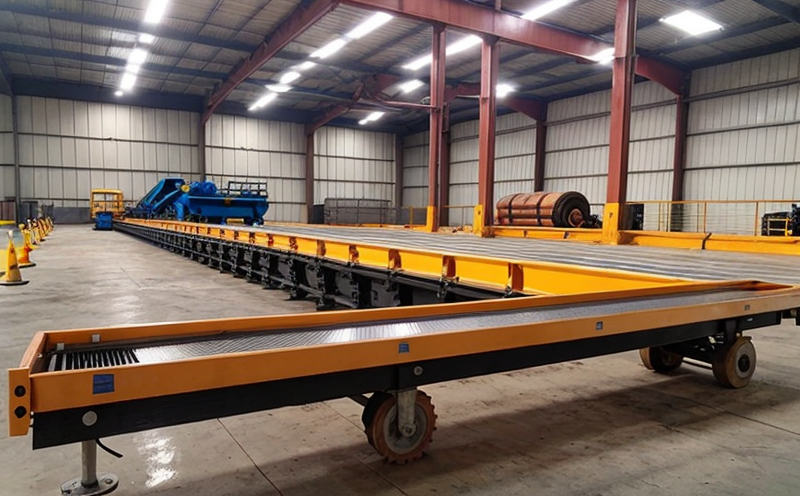Conveyor roller inspection
In industrial applications, conveyor rollers are vital components that ensure the smooth and efficient transport of materials. These rollers play a critical role in maintaining productivity within facilities by preventing downtime due to mechanical failures or wear. Conveyor roller inspection is an essential part of any maintenance strategy aimed at optimizing operational performance and extending equipment life. This service involves detailed examination and evaluation of conveyor rollers using advanced techniques to identify signs of damage, wear, or potential failure.
The process begins with a thorough visual inspection where experienced technicians look for visible signs of deterioration such as cracks, misalignment, or corrosion. Following this initial assessment, specific non-destructive testing (NDT) methods are employed depending on the type and material composition of the rollers. Common NDT techniques include ultrasonic testing, magnetic particle inspection, and radiographic examination.
Once the condition of each roller has been determined through these inspections, a comprehensive report is generated detailing findings along with recommendations for necessary repairs or replacements. This ensures that facility managers are aware of any issues before they become critical problems requiring extensive downtime to address.
A key aspect of conveyor roller inspection services lies in their ability to prevent costly equipment failures by identifying potential risks early on. By adhering strictly to established standards like ISO 13806 and ASME PCC-2, our team ensures that all inspections are conducted according to best practices which guarantees accurate results.
Conveyor roller inspection also helps facilities comply with industry regulations regarding occupational safety and health by ensuring that critical components remain in optimal working order. Properly maintained conveyors contribute significantly towards reducing hazards associated with improper handling of materials within industrial environments.
In conclusion, regular conveyor roller inspections are crucial for maintaining high levels of reliability across various sectors including manufacturing, logistics, mining, and construction. They provide peace of mind knowing that your facility's critical components are being monitored closely by professionals who understand both the technical aspects involved as well as broader business implications.
Benefits
The implementation of conveyor roller inspection services brings numerous benefits to industries relying heavily on efficient material transportation systems. Here are some key advantages:
- Extended Equipment Life: Regular inspections help detect early signs of wear and tear, allowing for timely maintenance before components fail completely.
- Increased Operational Efficiency: By keeping rollers in good condition, overall throughput can be maintained at optimal levels without interruptions caused by unexpected breakdowns.
- Safety Enhancement: Ensured proper functioning of conveyors reduces the risk of accidents and injuries among workers involved in material handling activities.
- Cost Savings: Preventative maintenance practices reduce long-term costs associated with repairs, replacements, and potential shutdowns due to equipment failures.
- Compliance Assurance: Adherence to regulatory requirements related to occupational safety ensures that your operations meet all necessary standards.
These benefits contribute not only to the immediate functionality of conveyors but also to long-term sustainability goals by promoting resource efficiency and minimizing waste generation within facilities.
Eurolab Advantages
EuroLab offers unparalleled expertise in conveyor roller inspection services, leveraging state-of-the-art technology and seasoned professionals dedicated solely to this field. Our unique selling points include:
- Comprehensive Assessment: Utilizing advanced NDT methods tailored specifically for various types of rollers ensures thorough evaluations.
- Expertise and Experience: Our team comprises industry leaders with decades of experience in mechanical engineering and quality assurance, providing unparalleled insights into best practices.
- Customized Solutions: Every inspection is conducted according to your specific needs, ensuring that no aspect of your conveyor system goes unexamined.
- Timely Reporting: Rapid turnaround times allow for immediate action based on inspection results, minimizing disruption to daily operations.
- Continuous Improvement: Leveraging cutting-edge methodologies and continuous learning enables us to stay ahead in providing the most effective solutions.
At EuroLab, we pride ourselves on delivering exceptional value through reliable, accurate inspections that cater directly to your unique requirements. Whether you need routine checks or more frequent assessments depending on usage patterns, our services are designed to meet all your needs efficiently and effectively.
Competitive Advantage and Market Impact
EuroLab's conveyor roller inspection service stands out by offering superior accuracy, reliability, and efficiency compared to other providers. Our commitment to precision ensures that even the most challenging inspections are handled with utmost care, resulting in minimal downtime for your facility.
- Advanced Technology: Utilizing top-tier NDT equipment guarantees accurate diagnosis of any issues present within rollers.
- Experienced Professionals: Our team consists exclusively of certified inspectors with extensive experience in this area, ensuring thorough and reliable results.
- Rapid Turnaround: Timely delivery of reports allows for swift implementation of necessary repairs or replacements, maintaining continuous operation.
EuroLab's conveyor roller inspection service has significantly contributed to enhancing the reputation of numerous leading companies across different industries. By consistently delivering high-quality services, we have helped them maintain compliance with stringent regulations while simultaneously improving their operational efficiency and reducing costs associated with maintenance and repair activities.





